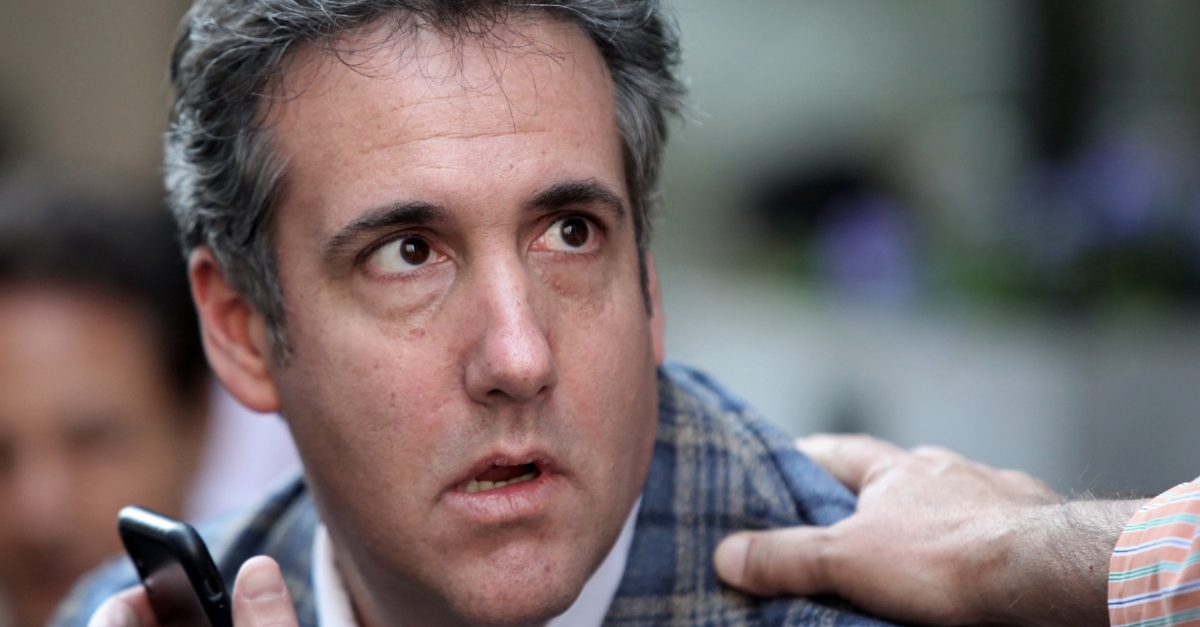
Michael Cohen, the former “fixer,” friend and sometimes lawyer to President Donald Trump is going home on Thursday.
The move is a vindication for Cohen, his family and their months-long legal battle and a win for those who have advocated for the release of at-risk incarcerated people amid the pandemic. It also puts to rest the “Why Paul Manafort but not Michael Cohen” narrative. According to an anonymous source cited by the Wall Street Journal, Cohen will be placed on federal prison furlough “pending processing to home confinement.”
The likely move comes after a contentious back-and-forth between Cohen and his advocates on one side and the prison and legal system bureaucracy on the other.
Earlier this month, Cohen’s legal advisor Lanny Davis scorned the process and its arbiters after an allegedly promised early release was apparently reneged upon.
“Following promises and published expectations, Michael Cohen remains in effect in solitary confinement, under quarantine, rather than under home confinement as he was led to believe would occur yesterday, May 1,” Davis said on May 2.
There were, however, also cries and whispers that Cohen had been placed in solitary confinement–technically known as the “Special Housing Unit”–due to some sort of mysterious altercation with another inmate at the Otisville Federal Correctional Institution in Upstate New York where Cohen was scheduled to serve out a three-year sentence for fraud and tax evasion. That story quickly went away.
Weeks prior to that incident, Cohen requested the terms of his imprisonment be adjusted to protect him from contracting the novel coronavirus (COVID-19) because federally-administered facilities have generally served as breeding grounds for–and because Cohen is particularly susceptible to contracting–the deadly contagion.
“Mr. Cohen has had two hospitalizations, and a pre-existing condition of pulmonary issues,” his attorney Roger B. Adler wrote. “I reiterate my belief that the coronavirus provides a basis for an appropriate modification of the venue in which his previously imposed sentence will be served, and that the sentence of 36 months should not end up being a capital crime depriving my client of his life.”
The leadership at the U.S. Attorney’s Office in the Southern District of New York (SDNY) disagreed with that idea. So Judge William Pauley III, who dismissed Cohen’s plea as little more than a bid for publicity.
“Apparently searching for a new argument to justify a modification of his sentence to home confinement, Cohen now raises the specter of COVID-19,” the judge’s order denying Cohen’s request read. “That Cohen would seek to single himself out for release to home confinement appears to be just another effort to inject himself into the news cycle. As the Government points out, he is ‘manifestly ineligible’ for compassionate release and has not exhausted his administrative remedies.”
But officials at the Bureau of Prisons apparently felt otherwise. Following Cohen’s administrative bid for home release directly via the federal system, the byzantine gears began to churn and things looked less than bleak for the New Yorker for the first time in a long time.
In late April, Otisville Camp Administrator Robert Scheffler reportedly told Cohen and around 70 other incarcerated individuals that they should plan for an indeterminate interruption in their current sentencing arrangements. Cohen was one of a handful who were explicitly advised that he would be leaving the facility by May 1, according to Davis.
That clearly didn’t happen. And Cohen’s team cried foul.
Cohen was, in fact, subject to solitary confinement. His attorneys and family were told the conditions of his release necessitated a 14-day quarantine in solitary. Those 14 days were over at the end of April, and Cohen anticipated he would be released and sent home by May Day.
“He remains in a cell in quarantine,” Davis said on May 2, “the functional equivalent of solitary confinement.”
Federal prison officials were still working on the release parameters it seemed–granting priority to people who have served at least half of their sentence or those with 18 months left overall who have served at least 25-percent of their sentences. At first glance, those groupings would not include Cohen. He’s only served roughly one year out of his three-year sentence.
But there’s a loophole; because Cohen has earned 162 days of good conduct credit, his release was already moved up to late November 2021–which means he has about 18 months left.
He’ll spend that year-and-a-half back at home.
[image via via Yana Paskova_Getty Images]